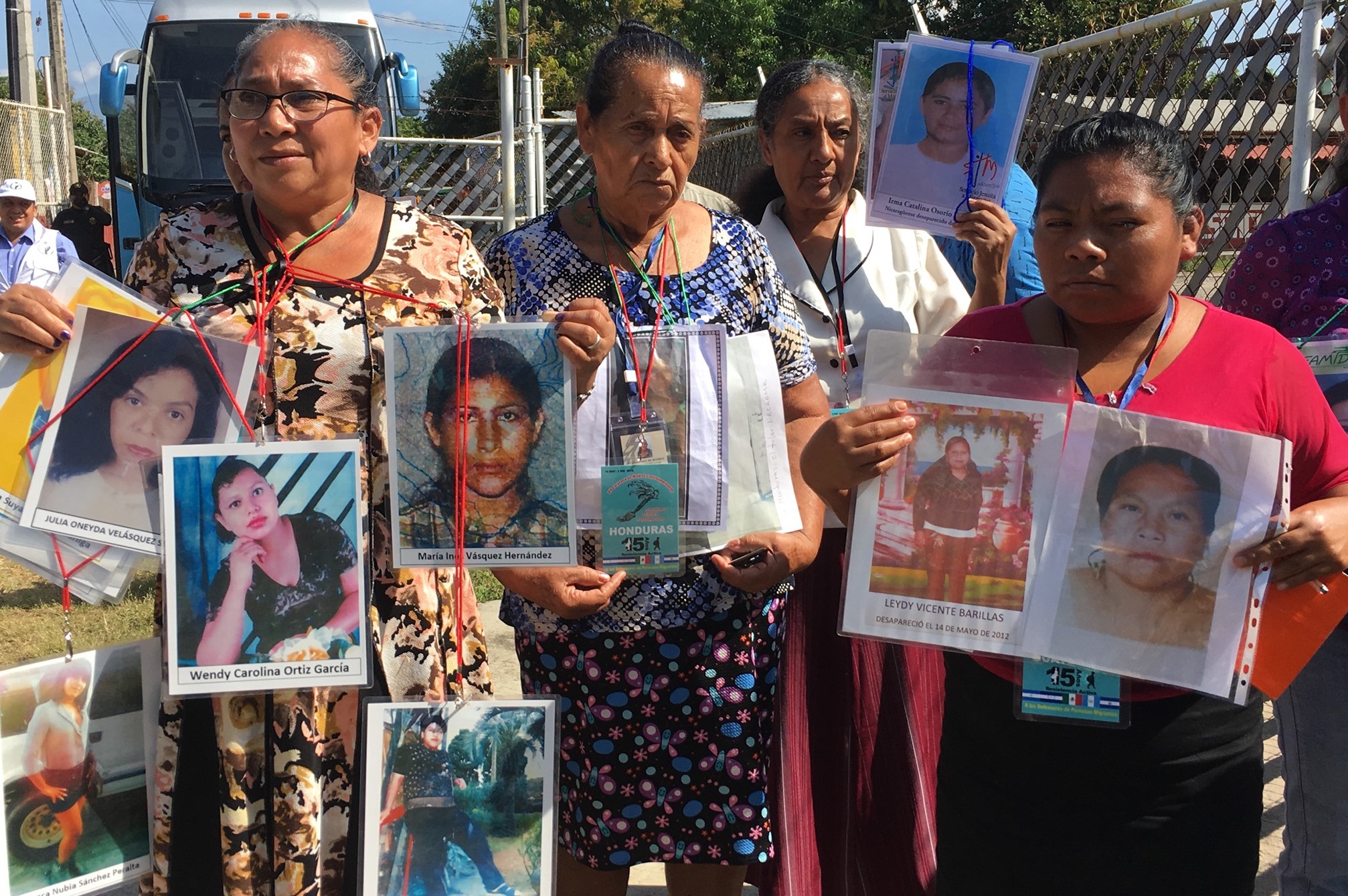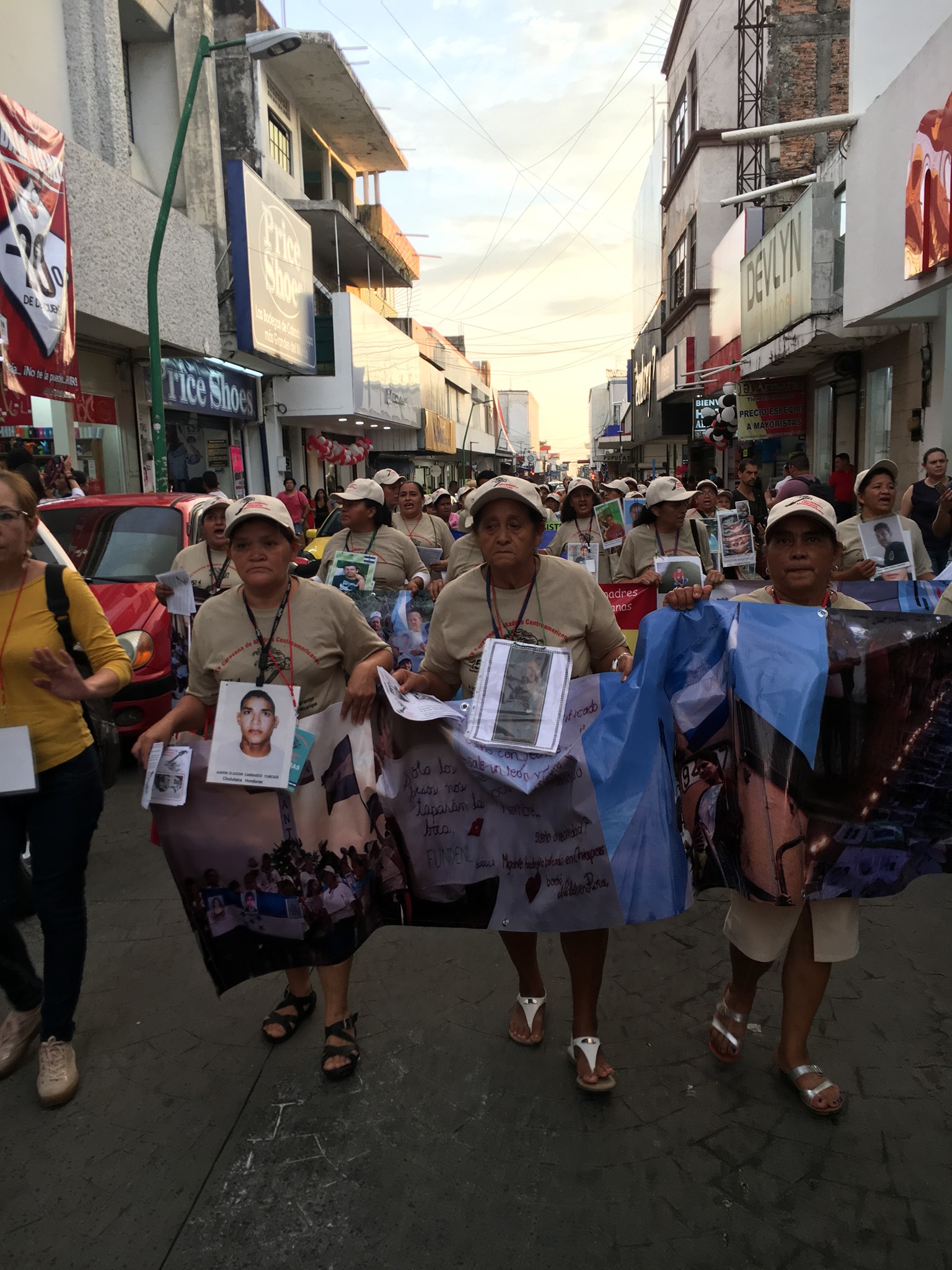Sitting cross-legged on a twin-sized bed in her hotel room, Lilian Esperanza Romero* shares why she became involved with the Caravan of Mothers of Missing Migrants. “My story begins decades ago,” she tells Remezcla in Spanish while peeling back a wool blanket and leaning into her niece as she braids her thick hair. A survivor of the bloody and brutal civil war that engulfed El Salvador in the 1980s, which was marked by U.S. interventionism and death-squad violence that left thousands dead and disappeared, Romero became involved with Comadres, a committee of relatives of citizens who were disappeared, imprisoned and assassinated during the period. Her own children escaped their home country during the armed conflict. On their transit through Mexico, Lilian lost contact with her 9-year-old daughter and 7-year-old son. It’s been 31 years.
“Thousands of children have disappeared en route in Mexico.”
On this day, she’s one of 38 Central American women on the Caravan of Mothers of Missing Migrants that is currently making its way through Mexico, desperately searching for their loved ones and denouncing the criminalization of migration across the hemisphere.
Decades after the peace accords that brought an end to El Salvador’s civil war, gang violence and economic despair continues to drive tens of thousands of citizens to flee the country. Central American immigrants are especially vulnerable during the 1,300-mile journey to the United States. Along the way, many are assaulted and abducted by criminal gangs and routinely abused and exploited by Mexican police and immigration officials. Since 2014, when then-President Enrique Peña Nieto announced Mexico’s “Programa Frontera Sur,” the country has ramped up immigration enforcement while state agents have been emboldened to target and victimize people during their precarious journeys north. To make matters worse, in response to President Donald Trump’s tariffs threat earlier this year, Mexico reached an agreement with the U.S. to further intensify immigration enforcement.

Thousands of children have disappeared en route in Mexico, some of them belonging to the mothers on this caravan. Starting their pilgrimage in Tapachula, a Mexican coastal city bordering Guatemala, the caravan follows the route of La Bestia, a freight train that many Central Americans ride to the U.S.-Mexico border. During the trip, many are vulnerable to abuse, theft and the loss of limbs or even their lives. Following the train’s route to Monterrey, a two-hour drive from the Texas border, the caravan hosts press conferences in town plazas, where mothers participate in forums with government officials to expose the human rights crisis affecting immigrants in transit through Mexico.
“We are not here looking for pity. We come seeking justice.”
“We are not here looking for pity. We come seeking justice,” Joel Saldivar* says during a meeting with the Comité Estatal de Búsqueda in Tamaulipas.
Theirs is not only a call for protection but, more urgently, an assertion of collective power. Although subject to state-sponsored and narco-related violence, these women refuse to be seen as passive victims or merely recipients of humanitarian care. Poverty, they insist, is not powerlessness.
Carrying their disappeared family members’ photographs around their necks, las Madres, who come from Honduras, El Salvador, Guatemala, Nicaragua and Mexico, demand justice and call out those responsible, including cartels, gangs and state forces. They march down bustling city streets and tranquil colonias, making their presence known by chanting, “Vivos se los llevaron, vivos los queremos” and “Hijo, escucha, tu madre está en la lucha.” They visit immigrant shelters and detention centers, looking for clues about their family members’ whereabouts—aware that they may have passed through these places while traversing Mexico’s militarized “vertical border.”

Sara Lopez*, whose 16-year-old son was kidnapped in Nuevo Laredo by criminal gangs known as “maras” in August 2018, tells Remezcla that she could not speak for months after his disappearance. Like many other Hondurans, he fled the country due to communal and familial poverty and had dreams of earning a better living in the U.S. and supporting his struggling family back home. When Lopez began attending local meetings for mothers of the disappeared, she could only muster the strength to plead, “Ayúdenme, ayúdenme.” But this week, in the city of Cordoba, she took the mic during a press conference to demand accountability for the crimes against her son. “They use us and kill us,” Lopez said in Spanish, pointing out the hypocrisy of countries that rely on immigrant labor and yet deny them basic human rights.
“They use us and kill us.”
Part prayer and part political commentary, press conferences are opportunities for women to release and process their trauma, says Lydia Cruz*, a mother from Guatemala looking for her own disappeared mother.
“Migrants have become merchandise,” she bellowed during another public event, commenting on the smuggling industry that profits from the vulnerability and precariousness of migratory crossings.
Not victims but human rights defenders, the Caravan of Mothers of Missing Migrants is part of a resistance movement in Latin America led by women. While the U.S. government turns its attention to the southern border through militarized immigration enforcement, family detention and concentration camps, Central American mothers, who are leading a transnational movement for immigrant justice and against the criminalization of migration, offer another form of leadership.
*Names have been changed to protect the mothers’ identities.







